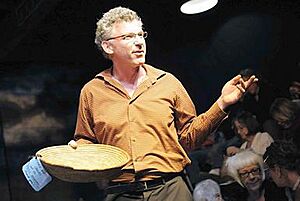Felix Wurman facts for kids
Quick facts for kids
Felix Wurman
|
|
|---|---|

Felix Wurman passing the donation basket at the Church of Beethoven (photograph by Morgan Petroski for the Albuquerque Journal)
|
|
| Background information | |
| Birth name | Felix Wurman |
| Born | October 27, 1958 Chicago, Illinois, United States |
| Died | December 26, 2009 (aged 51) Hillsborough, North Carolina, United States |
| Genres | Classical |
| Occupation(s) | Cellist |
| Instruments | Cello |
| Years active | 1970–2009 |
Felix Wurman (October 27, 1958 – December 26, 2009) was an American cellist and composer. He was known for his amazing cello playing and for creating new ways for people to enjoy classical music.
Contents
Early Life and Musical Start
Felix Wurman was born in Chicago, Illinois. His father, Hans Wurman, was also a composer and pianist who had to leave Austria when the Nazis were in power. Felix's brother, Alex Wurman, is also a composer.
Felix started playing the cello when he was only seven years old. By age 12, he was already performing with the famous Chicago Symphony Orchestra. He was invited to study at the Juilliard School, a very famous music school. But Felix chose to study in Europe with the British cellist Jacqueline du Pré. Even though du Pré could no longer play due to multiple sclerosis, she taught Felix for two years.
Domus: Music in a Dome
While living in England, Felix Wurman became very interested in chamber music. This is music played by a small group of musicians. He performed with other musicians at a place called Prussia Cove in England.
In the early 1980s, Felix helped start a special music group called Domus. What made Domus unique was their own portable concert hall! Felix built a tent shaped like a geodesic dome. This tent could be set up by the musicians themselves and could hold 200 people.
The group wanted to bring chamber music to more people. They performed in unusual places, not just traditional concert halls. Domus played at many festivals in Europe. They even won important awards, like two German Record Critics' Prizes and a Gramophone Award for their recording of music by Fauré.
Susan Tomes, a pianist who played with Domus, called Felix a "genius" who made people want to join his group. She remembered that Felix came up with the idea for the portable dome concert hall.
Returning to the United States
Later, Felix Wurman moved back to Chicago. He joined the Lyric Opera of Chicago Orchestra and worked as a freelance cellist, playing for different events.
Felix often went back to Europe to study. He learned from Anner Bylsma in Amsterdam. Bylsma encouraged Felix to build a special five-string cello. This allowed Felix to play many different types of music, including pieces originally written for the violin. He performed concerts with this special cello, and some of his performances were even broadcast on the radio.
Felix later moved to Albuquerque, New Mexico. There, he joined the New Mexico Symphony Orchestra. He also continued to play chamber music for local arts groups. Felix even started his own group called the Noisy Neighbors Chamber Orchestra, made up of musicians from the symphony. In 2000, the Noisy Neighbors started performing under a 200-seat geodesic dome, just like the Domus group. Felix said this was a way to continue the idea of bringing classical music to new places.
The Church of Beethoven
In 2007, Felix Wurman had a new idea after playing at a church service. He loved the feeling of people enjoying music together. He thought, "What if there was a 'church' where music was the most important part?"
Felix gathered musicians from the New Mexico Symphony Orchestra. They started playing Sunday concerts in an old gas station. He called these concerts the "Church of Beethoven." Felix wanted to help people "find spirituality through culture." He named it after Ludwig van Beethoven because he felt Beethoven put a lot of spiritual feeling into his music. Felix believed many people who weren't religious still wanted to feel uplifted on a Sunday morning.
The services included music and poetry readings. One poet said Felix wanted to create a feeling of community, like in a church, but without strict rules. The Albuquerque Journal described it as "an hourlong mix of music, poetry and readings." The Church of Beethoven became very popular and was featured on National Public Radio and in the Los Angeles Times. People described it as a "spiritual place, like a church for people who don't go to church."
In 2008, the Church of Beethoven moved to a renovated warehouse in downtown Albuquerque. This new space had a beautiful, "cathedral-like" feel with warm red walls and stained glass windows. A short film was even made about Felix and the Church of Beethoven.
Later Years
In November 2008, Felix Wurman was diagnosed with cancer. He had surgery in 2009. When the cancer returned, Felix moved to North Carolina to be near his sister and get treatment. Even after he left, the Church of Beethoven continued to thrive. Musicians and poets worked together to keep Felix's idea alive.
One week before Felix passed away, the Church of Beethoven held a special event to help with his medical care. It was a way for the community to show their appreciation for Felix's life and his dedication to music. Felix Wurman died in December 2009 from complications related to his illness.
Images for kids


